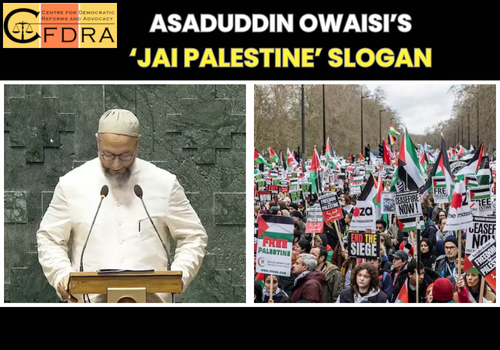Could Asaduddin Owaisi Face Disqualification as MP for ‘Jai Palestine’ Slogan

The recent chant of ‘Jai Palestine’ by Asaduddin Owaisi, a prominent Member of Parliament (MP) in India, has sparked significant controversy and debate. The slogan, which expresses solidarity with Palestine, has raised questions about the potential political and legal repercussions for Owaisi. This article examines whether Asaduddin Owaisi could face disqualification as an MP for his ‘Jai Palestine’ slogan, considering the legal framework, political context, and public reactions.
The Context of the ‘Jai Palestine’ Slogan
Asaduddin Owaisi, the leader of the All India Majlis-e-Ittehadul Muslimeen (AIMIM), is known for his outspoken views on various national and international issues. His recent chant of ‘Jai Palestine’ came amid heightened tensions in the Middle East, where the Israeli-Palestinian conflict had escalated. Owaisi’s slogan was seen as an expression of solidarity with the Palestinian people, who have long been engaged in a struggle for statehood and rights against Israeli occupation.
Legal Framework for Disqualification of MPs in India
The disqualification of MPs in India is governed by the Constitution, the Representation of the People Act, and the rules of parliamentary procedure. Key grounds for disqualification include holding an office of profit, being of unsound mind, being an undischarged insolvent, and not being a citizen of India. Additionally, MPs can be disqualified for defection under the Tenth Schedule of the Constitution, which addresses anti-defection laws.
In the context of Owaisi’s ‘Jai Palestine’ slogan, the relevant legal consideration would be whether his statement constitutes a breach of parliamentary conduct or incitement of enmity between different groups, as outlined in the Representation of the People Act. Specifically, Section 123(3) of the Act prohibits the promotion of enmity or hatred between different classes of citizens on grounds of religion, race, caste, community, or language.
Political Repercussions and Public Sentiment
The political landscape in India is deeply polarized, and Owaisi’s ‘Jai Palestine’ slogan has evoked strong reactions from various quarters. Supporters of Owaisi argue that his statement is an expression of his right to free speech and solidarity with an oppressed people. They see it as part of a broader narrative of advocating for human rights and justice on the global stage.
On the other hand, critics contend that Owaisi’s slogan is inflammatory and could potentially incite communal tensions within India. They argue that by aligning with an international conflict, Owaisi is diverting attention from domestic issues and potentially exacerbating existing religious and communal divides. Some have called for stringent action against him, including disqualification, to set a precedent against such statements by public representatives.
Historical Precedents and Comparisons
To assess the likelihood of Owaisi’s disqualification, it is useful to consider historical precedents and similar cases. India has seen instances where MPs and MLAs have faced disqualification or censure for their statements and actions. However, disqualification is a severe measure and is typically reserved for clear and egregious violations of the law or parliamentary conduct.
For example, in the past, MPs have been disqualified for corruption, criminal convictions, and defection. Statements expressing political opinions, even controversial ones, have rarely led to disqualification unless they explicitly incited violence or hatred. Therefore, the precedent suggests that while Owaisi’s statement is contentious, it may not meet the threshold for disqualification.
Possible Outcomes and Implications
The potential outcomes of this controversy could range from no action being taken to formal censure or disqualification. Given the legal and procedural requirements for disqualification, it appears unlikely that Owaisi will be disqualified solely for his ‘Jai Palestine’ slogan. However, political pressure and public sentiment could lead to other forms of reprimand, such as a parliamentary censure or a formal warning.
If Owaisi were to be disqualified, it would set a significant precedent and could have far-reaching implications for political discourse in India. It would signal a tightening of the boundaries around permissible speech for public representatives and could deter others from making similarly controversial statements.
Conclusion
Asaduddin Owaisi’s ‘Jai Palestine’ slogan has undoubtedly stirred controversy and debate about the limits of political expression and solidarity in India. While the legal framework for disqualification of MPs does not explicitly cover such statements unless they incite enmity or violence, the political and public reactions could influence the outcome. Historical precedents suggest that disqualification is unlikely, but other forms of reprimand could be considered. Ultimately, this episode highlights the delicate balance between free speech and responsible conduct for public representatives in a diverse and polarized society like India.
The broader implications of this controversy will continue to unfold, shaping the discourse around political expression and international solidarity in India’s democratic framework.


